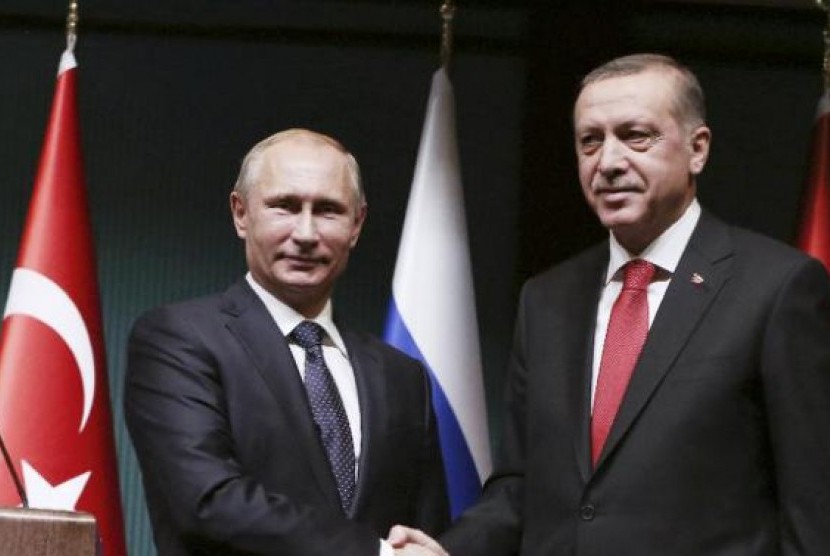REPUBLIKA.CO.ID, MOSCOW -- Moscow on Saturday slapped economic sanctions on Turkey in the latest tit-for-tat move over the downing of a Russian warplane, as Turkish leader Recep Tayyip Erdogan said he was "saddened" by the jet incident.
With the row showing no sign of abating, the Kremlin released the text of a decree signed by Russian President Vladimir Putin that announced an end to charter flights between the two countries, a ban on Russian businesses hiring any new Turkish nationals and import restrictions on certain Turkish goods.
It also asked Russian tour operators to refrain from selling trips to Turkey, normally a top holiday destination for Russian tourists.
The new measures come into effect from January 1, 2016. The list of Turkish goods subject to "bans or limitations" has not yet been made public.
The Kremlin announcement came just hours after Erdogan made his most conciliatory comments to date over the shooting down of the jet, saying he wished Tuesday's incident had never happened.
Turkey claims the Su-24 warplane strayed into its airspace and ignored repeated warnings to change course, but Russia has insists it did not cross the border from Syria.
The incident is thought to be the first downing of a Russian plane by a NATO member in more than half a century.
"I'm really saddened," Erdogan said. "We wish it had never happened, but it happened. I hope something like this doesn't happen again.
"We hope that the issue between us and Russia does not escalate any further, become corrosive and have dire consequences in the future," he added.
He also renewed a call to Putin for a face-to-face meeting in Paris on the sidelines of a UN climate summit on Monday.
But the Turkish leader stopped short of apologising for the incident, as a furious Putin had earlier demanded.
"Russia is important for Turkey as much as Turkey is important for Russia. Both countries cannot afford to give up on each other," Erdogan said.
A day earlier the Turkish leader had struck a more combative tone, warning Moscow not to "play with fire" as Russia announced it was halting visa-free travel for Turkish visitors, also from January 1.
Turkey's foreign ministry on Saturday warned its citizens against non-essential travel to Russia "until the situation becomes clear."
UN chief Ban Ki-moon told France 24 that the jet incident was "regrettable" and urged both sides to resolve their differences through dialogue, stressing that they were key members in the fight against the Islamic State (IS/ISIS) militant group.
One of the Russian pilots aboard the downed plane was shot dead in Syria after parachuting from the burning aircraft, while the second was found safe and sound. One Russian soldier was killed in a rescue operation.
Moscow has ruled out any military response, but has pledged broad measures targeting entire sectors of the Turkish economy including tourism, agriculture and possibly key energy projects.
Russian Foreign Minister Sergei Lavrov on Friday said Turkey had "crossed the line of what is acceptable" and warned the incident could severely undermine Turkey's national interests.
The two countries have established significant trade ties in recent years and Russia is already energy-poor Turkey's biggest oil and gas supplier.
But they are on opposing sides in the Syrian conflict, with Ankara backing rebels fighting to topple Syrian leader Bashar al-Assad while Moscow is one of his last remaining allies.
Turkish Prime Minister Ahmet Davutoglu meanwhile sought to ease tensions and appealed for the world to unite against IS, in an editorial published in The Times newspaper.
"The focus should be to tackle, head-on, the international threat that Daesh (IS) poses, securing the future of Syria and seeking a solution to the current refugee crisis," he wrote.


